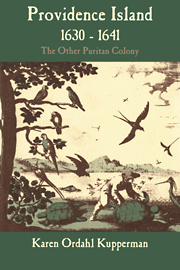Book contents
- Frontmatter
- Contents
- List of Maps
- Preface
- Author's Note
- 1 The Providence Island Company and Its Colony: The Program
- 2 Founding a Colony on Providence Island
- 3 Contested Authority: The Governorship of Captain Philip Bell
- 4 Frustrated Hopes for Economic Development
- 5 Land and Society: The Middling Planters
- 6 Servants into Slaves
- 7 Military Requirements and the People's Response
- 8 The Turbulent Religious Life of Providence Island
- 9 Governing Puritan Privateers: The Governorships of Robert Hunt and Nathaniel Butler
- 10 The Business History of the Providence Island Company
- 11 The End and Persistence of Providence Island
- Appendixes
- Bibliographical Essay
- Index
7 - Military Requirements and the People's Response
Published online by Cambridge University Press: 24 November 2009
- Frontmatter
- Contents
- List of Maps
- Preface
- Author's Note
- 1 The Providence Island Company and Its Colony: The Program
- 2 Founding a Colony on Providence Island
- 3 Contested Authority: The Governorship of Captain Philip Bell
- 4 Frustrated Hopes for Economic Development
- 5 Land and Society: The Middling Planters
- 6 Servants into Slaves
- 7 Military Requirements and the People's Response
- 8 The Turbulent Religious Life of Providence Island
- 9 Governing Puritan Privateers: The Governorships of Robert Hunt and Nathaniel Butler
- 10 The Business History of the Providence Island Company
- 11 The End and Persistence of Providence Island
- Appendixes
- Bibliographical Essay
- Index
Summary
MANY CAUSES CONTRIBUTED to the great outpouring of English men and women to America in the 1630s. Economic hardship impelled numerous emigrants to seek a better life, but many, especially puritans, were also fleeing new and unwelcome intrusions of the central government into the country's life. The drive toward a new Arminian religious conformity formed one area of intrusion, and large numbers chose America in order to worship as they believed God directed. Another was the government's push to create a “perfect militia” and to force the country to support a misconceived war effort against both Spain and France in the late 1620s.
These wars placed heavy strains on the relationship between king and parliament that was the heart of the English national political system. War also laid bare stresses in county and local government as it had developed under Stuart rule. And the demands of war placed intolerable burdens on the people in towns and countryside, who were already weighed down by inflation, harvest failure, and industrial depression. These problems helped men and women make the decision to emigrate to the new puritan colonies in the 1630s, but they also raised difficulties in the new settlements when colonial governments seemed to be making the same sort of demands as the Stuart monarchy. Defense, as seemed obvious to company investors in London, was a major concern for Providence Island, which was a sure target for Spanish attack. Company members could never understand settlers' reluctance to contribute time and effort freely to the fortification and defense of the island. They saw no link between colonists' experiences in England and the grievances they articulated in the Indies.
- Type
- Chapter
- Information
- Providence Island, 1630–1641The Other Puritan Colony, pp. 181 - 220Publisher: Cambridge University PressPrint publication year: 1993

